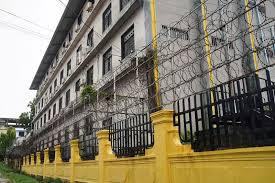Amnesty International has accused the Cambodian government of turning a blind eye to extensive human rights violations perpetrated by cybercrime syndicates operating brutal scam compounds across the country.
In a report released on Thursday, the London-based human rights organisation alleged that criminal gangs have trafficked individuals—including children—from various countries and forced them into captivity in heavily guarded facilities, where they are coerced into committing online fraud under inhumane conditions.
The report identified at least 53 confirmed scam centres and numerous suspected sites, including locations in the capital, Phnom Penh. These compounds, according to Amnesty, are surrounded by high walls topped with razor wire and guarded by armed personnel. Inside, victims of human trafficking are allegedly held against their will and subjected to physical abuse if they attempt to resist or escape.
“Victims reported being punished with electric shocks from batons, beatings, and solitary confinement in dark, locked rooms,” the report stated.
Amnesty said the findings reveal a broader “pattern of state failures,” citing the government’s inability or unwillingness to investigate abuses, provide proper victim support, or regulate private security firms and the use of torture equipment within these compounds.
“Deceived, trafficked, and enslaved, survivors of these scamming compounds describe a living nightmare—forced into criminal operations that appear to function with the tacit approval of the Cambodian government,” said Agnès Callamard, Amnesty International’s Secretary General.
Despite being presented with detailed information on known and suspected scam sites, Cambodian authorities reportedly failed to provide meaningful responses. The country’s National Committee to Combat Human Trafficking, Amnesty noted, offered only vague statistics on interventions and lacked evidence of serious legal action beyond charges related to illegal detention.
The Cambodian government has previously claimed to be addressing the issue and, in January, launched a national task force led by Prime Minister Hun Manet to combat cybercrime. However, Amnesty’s investigation found that more than two-thirds of the compounds it assessed either remained operational or had not been investigated, even after police visits.
In the few cases where police actions were recorded, Amnesty said the intervention was minimal. Police reportedly refrained from entering the compounds directly, instead coordinating with compound managers to release only the victims who had made distress calls. Some survivors claimed they were beaten by supervisors after attempting to contact authorities.
The report underscores growing international concern about Cambodia’s role as a hub for organised cybercrime and calls for urgent action to dismantle scam operations and hold perpetrators accountable.









